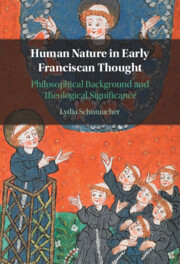Book contents
- Human Nature in Early Franciscan Thought
- Human Nature in Early Franciscan Thought
- Copyright page
- Dedication
- Contents
- Acknowledgements
- Key to Summa Halensis Citations
- List of Abbreviations
- Introduction
- 1 The Philosophy of the Soul c.1150–1215
- 2 Theological Background
- 3 The Soul and the Body
- 4 The Powers of the Soul
- 5 Cognitive Powers
- 6 Cognitive Powers in John of La Rochelle’s Summa de anima
- 7 The Reception of Averroes in Early Scholasticism
- 8 Cognitive Powers
- 9 The Affections
- 10 Free Choice
- 11 Angels
- 12 Conclusion
- Bibliography
- Index
12 - Conclusion
Published online by Cambridge University Press: 27 January 2023
- Human Nature in Early Franciscan Thought
- Human Nature in Early Franciscan Thought
- Copyright page
- Dedication
- Contents
- Acknowledgements
- Key to Summa Halensis Citations
- List of Abbreviations
- Introduction
- 1 The Philosophy of the Soul c.1150–1215
- 2 Theological Background
- 3 The Soul and the Body
- 4 The Powers of the Soul
- 5 Cognitive Powers
- 6 Cognitive Powers in John of La Rochelle’s Summa de anima
- 7 The Reception of Averroes in Early Scholasticism
- 8 Cognitive Powers
- 9 The Affections
- 10 Free Choice
- 11 Angels
- 12 Conclusion
- Bibliography
- Index
Summary
The conclusion summarizes the findings of every chapter with a view to bolstering the book’s main contention, namely, that early Franciscan thought on human nature is chiefly indebted to Islamic and Jewish sources originally written in Arabic rather than to Augustine. As the chapter re-iterates, the early Franciscan invocation of pseudo-Augustinian sources was part of a strategy for legitimizing the use of those newer philosophical sources. These in turn aided them in the construction of a unique tradition of philosophical thought, which accorded with the theological values of the Franciscan religious order.
- Type
- Chapter
- Information
- Human Nature in Early Franciscan ThoughtPhilosophical Background and Theological Significance, pp. 285 - 308Publisher: Cambridge University PressPrint publication year: 2023

